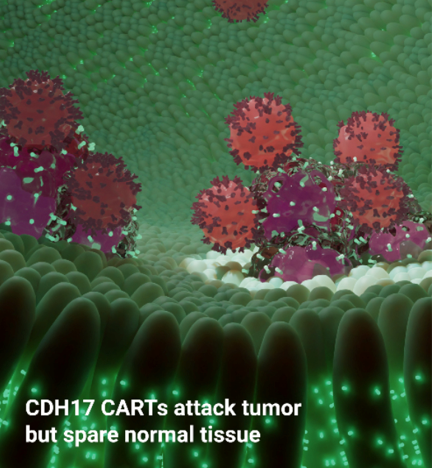
PHILADELPHIA — Chimeric antigen receptor (CAR) T cells can be remarkably effective in treating leukemias and lymphomas, but there are no successful immunotherapies for neuroendocrine tumors (NETs) and gastrointestinal cancers (GICs) yet. Researchers at Penn Medicine have discovered that CAR-T cells directed to a tumor antigen, CDH17, a cell surface marker expressed on both NETs and GICs but also found on healthy tissues, eliminated GICs in several preclinical models without toxicity to normal tissues in multiple mouse organs, including the small intestine and colon. The results from this study, the first to target CDH17 in neuroendocrine tumors, suggest a new class of tumor associated antigens accessible to CAR-T cells in tumors but sequestered from CAR-T cells in healthy tissues.
In the study, published March 21 in Nature Cancer, researchers isolated a llama-derived nanobody, a small antibody, which led to the identification of CDH17. Targeting CDH17—which, in humans as in mice, is mainly expressed in the intestinal system—with CDH17CAR T cells eliminated gastric, pancreatic, and colorectal cancers in mouse models. While CDH17 is also expressed in normal intestinal epithelial cells, the CDH17CAR T cells did not attack the normal cells, likely because the CAR T cells cannot reach or bind to healthy tissue in the tight junction between normal intestine epithelial cells, creating a "masking" effect in healthy cells from CAR T attack.
"Our work demonstrates that CDH17CAR T cells can eliminate solid tumors like NETs and GICs, but do not damage healthy, normal tissues that also express CDH17, because CDH17 is sequestered and hidden between the normal cells," said senior author Xianxin Hua, MD, PhD, a professor in the Department of Cancer Biology in the Abramson Family Cancer Research Institute at Penn. "This opens avenues to explore a new class of tumor antigens that are also expressed in normal cells but protected by the CAR T cell attack and is hopefully another important step in developing safer immunotherapies for solid tumors."
GICs and NETs are often fatal once they have spread. There are about five million new cases of GICs annually worldwide, underscoring the need for scientific and clinical advancements.
"Now that we have identified CDH17 as a promising new class target, we can take a multipronged approach to target CDH17 and launch a phase 1 study to treat drug-resistant NETs and GICs," said first author Zijie Feng, a research scientist in the department of Cancer Biology at Penn. "The CDH17 CAR T cells may be particularly suitable for patients with solid tumors, and these findings motivate additional investigation of CAR Ts that can be developed against previously written-off tumor-associated antigens."
Other Penn researchers on the study include Carl H. June, MD, the Richard W. Vague Professor in Immunotherapy in the Department of Pathology and Laboratory Medicine; Bryson Katona, MD, PhD, director of the Gastrointestinal Cancer Genetics Program; Terence P. Gade, MD, PhD, co-director of the Penn Image-Guided Interventions Laboratory; and David C. Metz, MBBCh, a professor CE of Medicine in the Divison of Gastroenterology and Hepatology.
In 2021, the University of Pennsylvania and Chimeric Therapeutics, Limited entered into an exclusive licensing agreement for the first CDH17 CAR T cell therapy to be explored for clinical research.
This study was funded by a Care for Carcinoid Foundation Research Grant and a Neuroendocrine Tumor Research Foundation (NETRF) Accelerator Grant.






